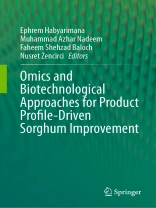This edited book is focused on Sustainable Development Goal 2, which aims to achieve ‘Zero Hunger.’ It provides deep insights into the global sorghum status, limitations to its production, advancements in agronomic practices, and the application of high-throughput phenotyping technologies.
Sorghum plays a vital role in global food security, agricultural sustainability, and rural livelihoods, making it an important crop for both developing and developed countries. It is a staple food for millions of people around the world, particularly in arid and semi-arid regions where other crops may struggle to grow. Sorghum exhibits significant genetic diversity, providing a rich resource for breeding programs aimed at developing improved varieties with traits such as higher yield, disease resistance, and nutritional quality. The book enhances readers’ understanding of classical breeding methods and their role in sorghum improvement. It also focuses on the contribution of OMICs and biotechnological approaches to sorghum improvement. Detailed information about the genetic and genomic resources of sorghum provided is helpful for the scientific community to utilize in sorghum breeding. Chapters highlight sorghum genome sequencing, transgenic and hybrid sorghum, and the application of genome editing.
This book is useful to the breeding community, serving as a resource for interdisciplinary research groups such as geneticists, breeders, biotechnologists, bioinformaticians, and students, supporting them in accelerating their activities related to sorghum breeding.
表中的内容
Chapter 1. Trends in Global Sorghum Production: Perspectives and Limitations.- Chapter 2. Agronomic Practices for Sorghum Production.- Chapter 3. Adaptability and Cultivation of Sorghum under Climate Change Scenarios.- Chapter 4. Advancing Sorghum Improvement through High Throughput Phenotyping Technologies.- Chapter 5. Sorghum Potential for Nutrition and Food Security.- Chapter 6. Crop Wild Relatives of Sorghum as a Novel Source Variation for Crop Improvement.- Chapter 7. Hybrid Sorghum Production: Considerations according to Breeder and End-User.- Chapter 8. Breeding Techniques for the Major Sorghum Market Segments: Grain, Forage, Biomass and Soluble Sugars.- Chapter 9. Photoperiod and Temperature Sensitivity in Sorghum.- Chapter 10. Status of Sorghum Breeding in Asia.- Chapter 11. Breeding Advancements of Sorghum in Europe.- Chapter 12. Marker-Assisted Breeding in Major Insect Pest of Sorghum Crop.- Chapter 13. Mitigating Abiotic Stress through the Application of Genomic and Breeding Strategies in Sorghum.- Chapter 14. OMICs Approaches for Improving Sorghum Value Chains.- Chapter 15. New Breeding Trends in Sorghum.- Chapter 16. Future Strategies for Sorghum Improvement under Climate Change Scenario.- Chapter 17. Summary of the Potential and Exploitation of Omics and Biotechnological Breakthroughs in Sorghum.- Chapter 18. Sorghum Environment Characterization and G × M Modelling Toolbox.
关于作者
Prof. Dr. Ephrem Habyarimana is a Principal Scientist, head of Sorghum Breeding at the International Crops Research Institute for the Semi-Arid Tropics headquartered in Patancheru, Telangana, India; he is also a Professor of Agricultural Genetics at the University of Agricultural Sciences, Raichur, Karnataka, India. He has more than 25 years of experience in crop science, genetics, and plant breeding with a particular focus on sorghum, integrating diverse technologies and skills i.e., agroecological and genomic modeling, big data analytics e.g., phenomics, genomics for sustainable, resilient, cost-effective, environment and biodiversity-friendly crop improvement, and for optimizing the breeding program to deliver higher rates of genetic gains. He trained in North and Latin America, Africa, Asia, and Europe, and authored several specialized scientific articles and books as documented under Scopus and other certified databases. He is recognized as an inventor by the European Commission in the fields of Exploratory and market-ready Deep Tech innovations, and he was a finalist for the 2019 European Data Sci & Artificial Intelligence Awards
Dr. Muhammad Azhar Nadeem, working as an Associate Professor at the Faculty of Agricultural Sciences and Technologies, Sivas University of Science and Technology, Türkiye has documented great skills and expertise in crop science, plant genomics, and molecular plant breeding. Dr. Nadeem has been actively engaged in research activities involving the assessment of genetic diversity, and population structure and performing genome-wide association studies (GWAS) for the identification of genomic regions associated with the traits of interest. Dr. Nadeem has numerous research publications and has served as the editor and co-editor of four published books.
Dr. Faheem Shehzad Baloch is working as Professor of plant genetics and breeding at Mersin University, Turkey. He received his Ph.D. with a dissertation on ‘QTL mapping in wheat’ from University of Çukurova, Adana, Turkey. He has more than 11 years of teaching and research experience in the plant phenomics, genetics and genomics, and biotechnology. He has led and participated in many projects funded by national and international organizations. He has visited more than 30 countries over different continents for research and collaborative purposes and serve as Management Committee and active member of various COST actions and playing important roles in different work packages of various COST actions. He has more than 120 SCI publications in WOS and edited 9 books and written over 19 book chapters on important aspects of molecular genetics in relation to plant species. He has extensive array of citations with over 4300 times as per google scholar with an h-Index of 35. He serves as Editorial board member of several high impact factor journals.
Dr. Nusret Zencirci is a graduate of Çukurova University, Faculty of Agriculture, Department of Field Crops. He worked as a wheat breeder in the Central Research Institute for Field Crops, Ankara and served as National and international Coordinator to Wheat programs including International Winter Wheat Improvement Program carried by Türkiye, CIMMIYT, and ICARDA. He is a molecular biology professor now at Bolu Abant İzzet Baysal University, Science and Art Faculty, Biology Department, Bolu, Turkey. He is a member of various editorial boards in many international journals. He is, with his team, breeder of 22 bread and durum wheat cultivars. His research interests are Cereals, Biotic and Abiotic Stresses, Plant Genetic Resources, and Wheat Breeding.












